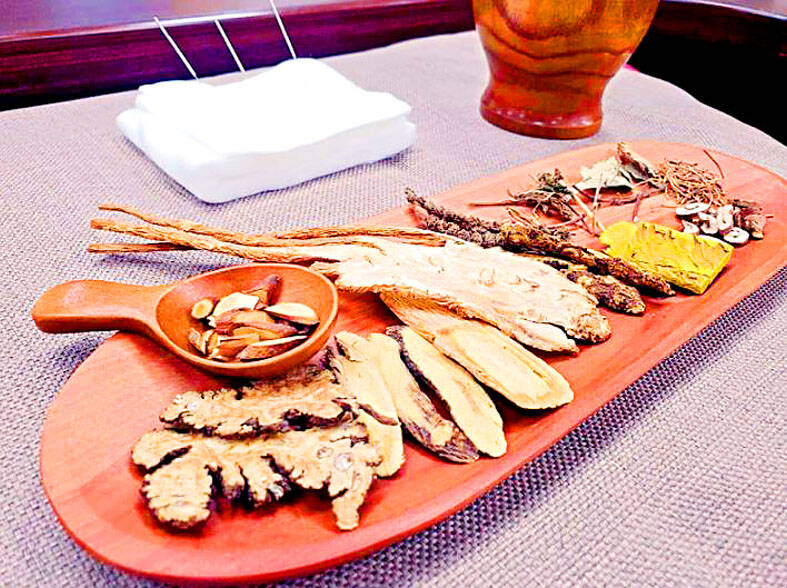Costs are spiking in the traditional Chinese medicine sector due to the nation’s reliance on China for ingredients, a China Medical University professor said on Friday.
The prices of some traditional Chinese medicine products have risen three to five times their original prices, while others are in short supply, such as goldthread and Manchurian wild ginger, pharmacy professor Huang Shyh-shyun (黃世勳) said.
“The main problem is the high reliance on China for imports of traditional Chinese medicine. Taiwan should source its ingredients from other countries,” Huang said.

Photo: Taipei Times file
The government should develop “Taiwanese traditional medicine” by researching alternative ingredients or sources outside of China to prevent shortages, he said.
For example, Wolfiporia extensa — a medicinal mushroom also known as poria — was mainly imported from China’s Fujian Province, but is now also imported from South Africa, while Chinese licorice was previously imported from Xinjiang, but is now mostly imported from Pakistan, he said.
“In Taiwan, we conduct tests and quality control checks on all imported herbal medicine. We found that the quality [of these products] is on the same level as those from China,” he said.
While the Compendium of Materia Medica (本草綱目), a Ming
Dynasty-era encyclopedia of herbal medicine, lists 1,892 items, traditional Chinese medicine practitioners usually only use about 400 to 500 ingredients, Huang said.
“There is more medicinal knowledge recorded in other ancient texts, so we still have plenty of room for improvement, to find single ingredients with many uses,” he said.
Practitioners can also consider alternative ingredients for treatments, such as the underground stem of the Onychium japonicum, a fern that grows in Taiwan, to replace goldthread, he said.
Although not often used in traditional Chinese medicine, creeping woodsorrel (Oxalis corniculata) has anti-inflammatory properties, while Angelica acutiloba — which is used in traditional medicine in Japan — can be used in place of female ginseng (Angelica sinensis), he said.
However, A acutiloba is not listed in the Ministry of Health and Welfare’s Taiwan Herbal Pharmacopeia (台灣中藥典), which is updated every five years, most recently last year.
“If it is not listed there, then it cannot be prescribed by traditional Chinese medicine practitioners in Taiwan,” Huang said, adding that it could still be used as a cooking ingredient.
“The government should help develop the use of domestic plants and herbal materials, and research how these can be used in traditional Chinese medicine,” he said.
Meanwhile, traditional Chinese medicine practitioners must research multiple uses for already available ingredients to develop replacements, he added.
“Only then can we lower our reliance on traditional Chinese medicine from China,” he said.
Eighty-six percent of Taiwan’s traditional Chinese medicine products are imported from China, Department of Chinese Medicine Director-General Huang Yi-tsau (黃怡超) said.
The government is working with New Southbound Policy countries to find alternate sources, he said.
The government has also allocated NT$4 million (US$128,193) to implement a program for cultivating traditional Chinese medicinal plants, he added.

Costa Rica sent a group of intelligence officials to Taiwan for a short-term training program, the first time the Central American country has done so since the countries ended official diplomatic relations in 2007, a Costa Rican media outlet reported last week. Five officials from the Costa Rican Directorate of Intelligence and Security last month spent 23 days in Taipei undergoing a series of training sessions focused on national security, La Nacion reported on Friday, quoting unnamed sources. The Costa Rican government has not confirmed the report. The Chinese embassy in Costa Rica protested the news, saying in a statement issued the same

Taiwan’s Liu Ming-i, right, who also goes by the name Ray Liu, poses with a Chinese Taipei flag after winning the gold medal in the men’s physique 170cm competition at the International Fitness and Bodybuilding Federation Asian Championship in Ajman, United Arab Emirates, yesterday.

A year-long renovation of Taipei’s Bangka Park (艋舺公園) began yesterday, as city workers fenced off the site and cleared out belongings left by homeless residents who had been living there. Despite protests from displaced residents, a city official defended the government’s relocation efforts, saying transitional housing has been offered. The renovation of the park in Taipei’s Wanhua District (萬華), near Longshan Temple (龍山寺), began at 9am yesterday, as about 20 homeless people packed their belongings and left after being asked to move by city personnel. Among them was a 90-year-old woman surnamed Wang (王), who last week said that she had no plans

TO BE APPEALED: The environment ministry said coal reduction goals had to be reached within two months, which was against the principle of legitimate expectation The Taipei High Administrative Court on Thursday ruled in favor of the Taichung Environmental Protection Bureau in its administrative litigation against the Ministry of Environment for the rescission of a NT$18 million fine (US$609,570) imposed by the bureau on the Taichung Power Plant in 2019 for alleged excess coal power generation. The bureau in November 2019 revised what it said was a “slip of the pen” in the text of the operating permit granted to the plant — which is run by Taiwan Power Co (Taipower) — in October 2017. The permit originally read: “reduce coal use by 40 percent from Jan.